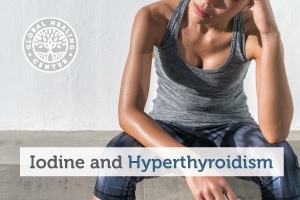
Your thyroid gland produces the hormones that control and regulate your metabolism. Iodine is the fuel it runs on. Too little iodine and you may experience hypothyroidism, a condition in which the thyroid does not produce enough hormones. Conversely, hyperthyroidism occurs when the thyroid produces too much of the thyroid hormone thyroxine. As a metabolism regulator, over production impacts the body at the cellular level. This can ultimately lead to symptoms such as weight loss, anxiety, fatigue, hyperactivity, and a general intolerance to heat. Cardiac shock and death can also occur in extreme cases. [1]
The most common causes for this hormone overproduction are Grave's Disease (an autoimmune disorder), inflammation of the thyroid (thyroiditis), or thyroid nodules that create and release excess thyroxine. More rare causes include medications such as Amiodarone (an anti-arrhythmia drug) overconsumption of thyroid hormone tablets, or consumption of processed or ground beef contaminated with thyroid tissue.
And, while somewhat rare, over ingestion of iodine, a precursor element of thyroxine, has also been reported as a cause.

How Iodine Affects Your Thyroid
Length: 2 minutes
Iodine as a Cause of Hyperthyroidism
Balance is important in all aspects of life, especially nutrition. While iodine deficiency plagues much of the world, consuming too much iodine can also be a concern. Dietary sources high in iodine, such as kelp, if taken in extreme abundance, can introduce too much iodine into the body and create an iodine-induced hyperthyroidism. Iodine used for medical reasons, such as an antiseptic on a hospital dressing, as a contrast agent, or from the administration of solutions containing iodine can also lead to its development. [2]
While too much iodine can induce hyperthyroidism, iodine can, oddly enough, also be the solution.
Iodine as the Solution to Hyperthyroidism
Iodine can be used to slow thyroid hormone release. Potassium iodide, Lugol's solution, or, my personal preference, nascent iodine, can be used to initiate this effect. Applied in this way, iodine can halt complications like those of a Thyroid Storm, where the thyroid overproduces and over releases thyroid hormones leading to serious and potentially fatal effects.
In some cases, small amounts of Iodine-131 (a radioactive iodine) will be applied to slow thyroid hormone production. Studies of individuals exposed to iodine-131 radiation have shown consistent development of hypothyroidism, a condition of reduced thyroid hormone output. [3] In medical applications, only the smallest amount is used to achieve the necessary result.
Manage Iodine Levels for Best Health
Conditions like hyperthyroidism can lead to serious complications - heart concerns, osteoporosis, concerns with the eyes from vision to physically bulging eyes, and thyroid storm can create life-threatening situations. Maintaining healthy iodine levels is the best method to promote thyroid health and function.

Watch an In-Depth Video on Everything You Need to Know About Iodine
Length: 61 minutes
References (3)
- Hjørringgaard J, Birkelund T, Ravn HB. [Cardiac arrest and cardial insuffiency as result of thyrotoxicosis]. Ugeskr Laeger. 2013 Apr 1;175(14):962-3.
- Brotfain E, Koyfman L, Frenkel A, Smolikov A, Zlotnik A, Klein M. Iodine-induced hyperthyroidism-an old clinical entity that is still relevant to daily ICU practice: a case report. Case Rep Endocrinol. 2013;2013:792745. doi: 10.1155/2013/792745. Epub 2013 Apr 9.
- Ostroumova E, Rozhko A, Hatch M, Furukawa K, Polyanskaya O, McConnell RJ, Nadyrov E, Petrenko S, Romanov G, Yauseyenka V, Drozdovitch V, Minenko V, Prokopovich A, Savasteeva I, Zablotska LB, Mabuchi K, Brenner AV. Measures of Thyroid Function among Belarusian Children and Adolescents Exposed to Iodine-131 from the Accident at the Chernobyl Nuclear Plant. Environ Health Perspect. 2013 Jul;121(7):865-71. doi: 10.1289/ehp.1205783. Epub 2013 May 1.
†Results may vary. Information and statements made are for education purposes and are not intended to replace the advice of your doctor. If you have a severe medical condition or health concern, see your physician.







